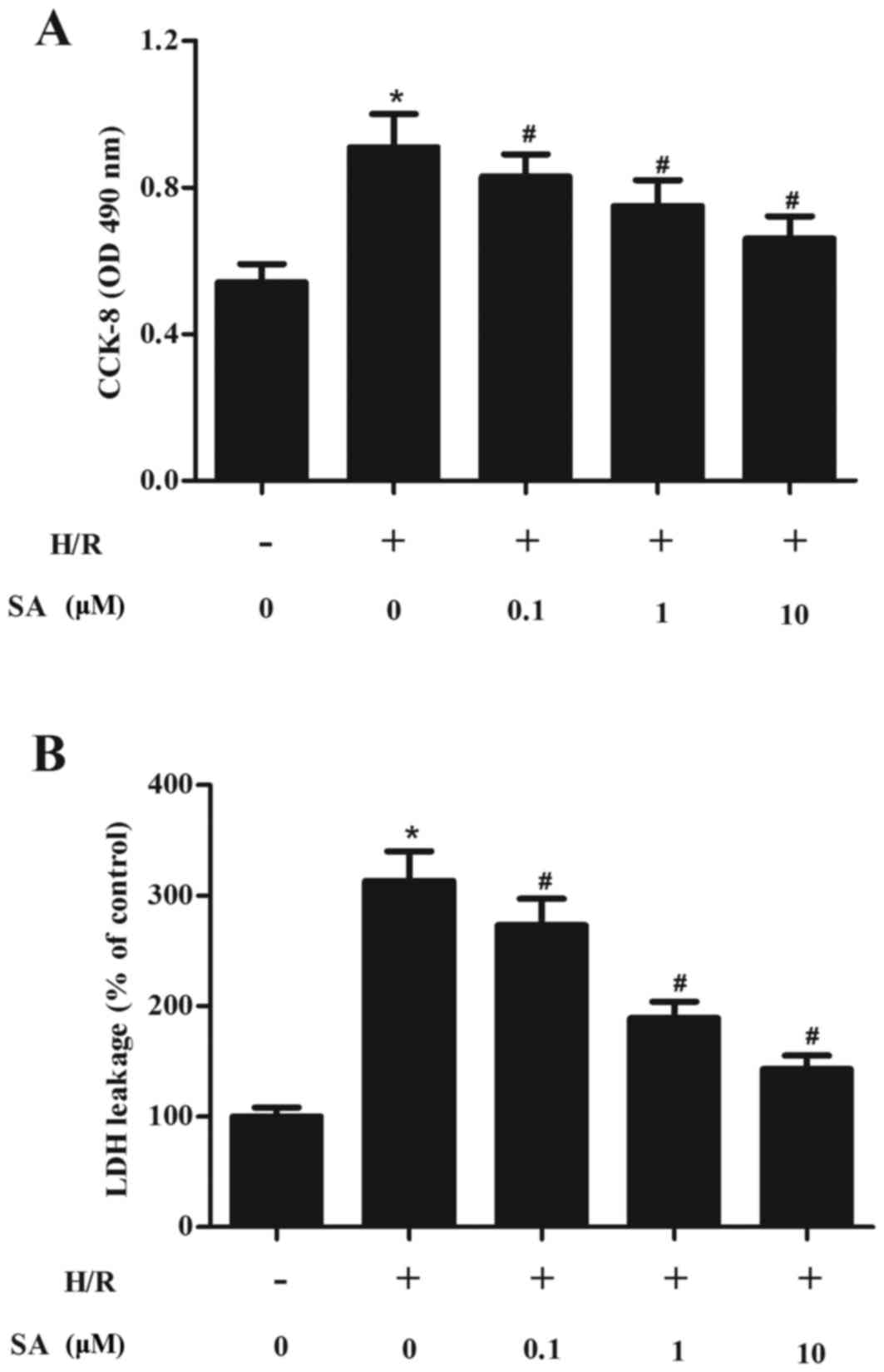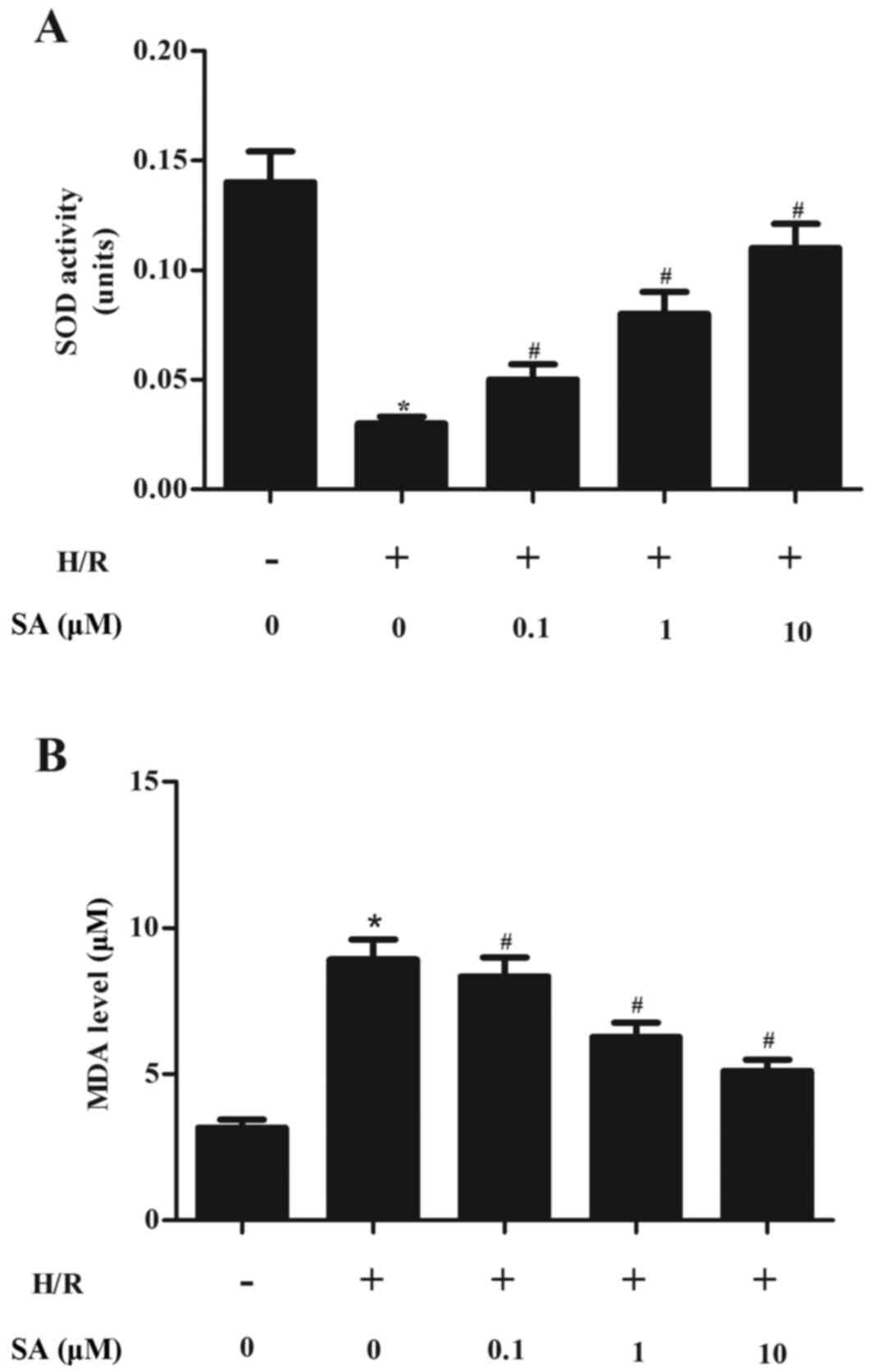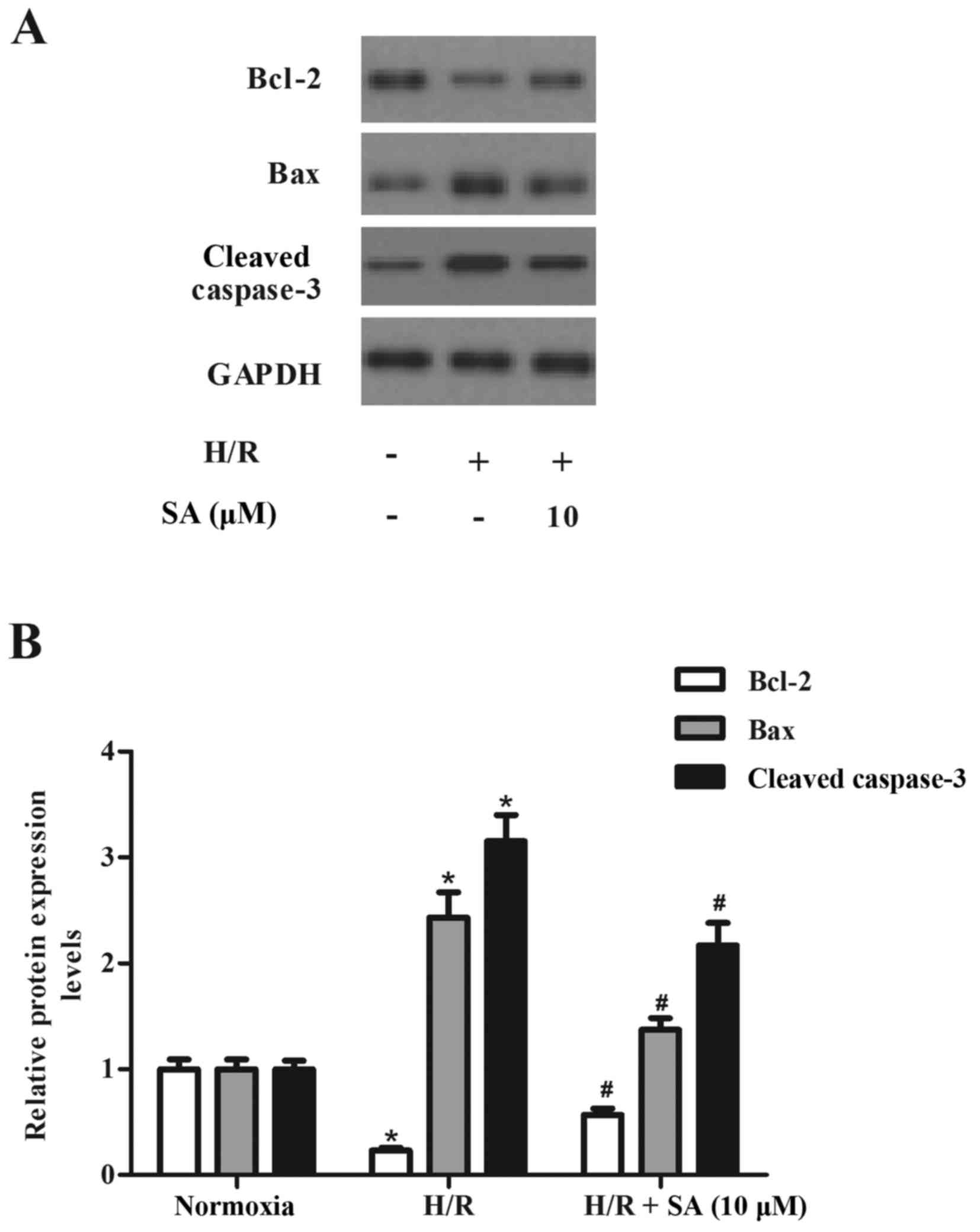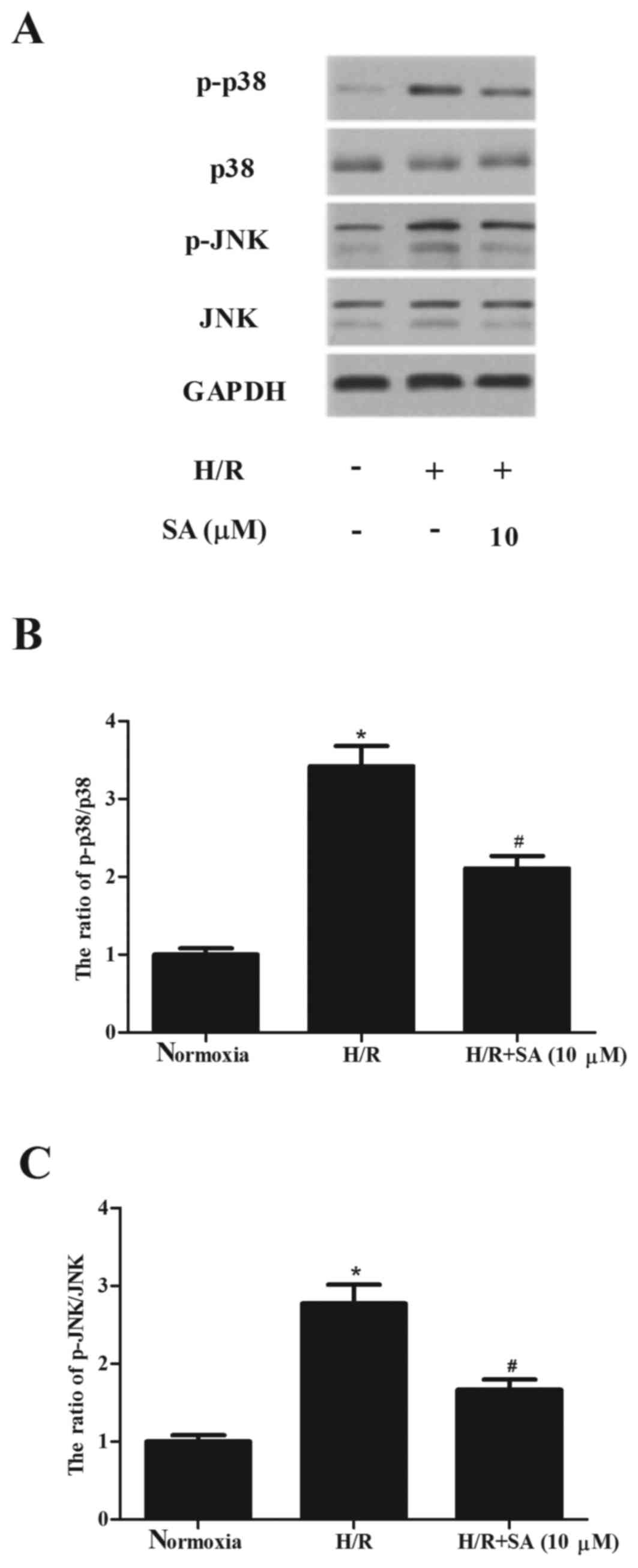|
1
|
Hausenloy DJ and Yellon DM: Myocardial
ischemia-reperfusion injury: A neglected therapeutic target. J Clin
Invest. 123:92–100. 2013. View
Article : Google Scholar : PubMed/NCBI
|
|
2
|
Fintel DJ, Subacius H and Goldberger J:
Effect of metoprolol versus carvedilol on survival after myocardial
infarction. J Am Coll Cardiol. 67:20912016. View Article : Google Scholar
|
|
3
|
Erlinge D, Götberg M, Noc M, Lang I,
Holzer M, Clemmensen P, Jensen U, Metzler B, James S and Bøtker HE:
Therapeutic hypothermia for the treatment of acute myocardial
infarction-combined analysis of the RAPID MI-ICE and the CHILL-MI
Trials. Ther Hypothermia Temp Manag. 5:77–84. 2015. View Article : Google Scholar : PubMed/NCBI
|
|
4
|
Henri O, Houssari M, Pouehe C, Galas L,
Nicol L, Edwards-Lévy F, Henry JP, Dumesnil A, Schapman D and
Thuillez C: Therapeutic lymphangiogenesis improves diastolic
function by limiting cardiac edema and fibrosis after myocardial
infarction. Circulation. 132:A12624. 2015.
|
|
5
|
Yellon DM and Hausenloy DJ: Myocardial
reperfusion injury. New Engl J Med. 357:1121–1135. 2007. View Article : Google Scholar : PubMed/NCBI
|
|
6
|
Turer AT and Hill JA: Pathogenesis of
myocardial ischemia-reperfusion injury and rationale for therapy.
Am J Cardiol. 106:360–368. 2010. View Article : Google Scholar : PubMed/NCBI
|
|
7
|
Ham JR, Lee HI, Choi RY, Sim MO, Seo KI
and Lee MK: Anti-steatotic and anti-inflammatory roles of syringic
acid in high-fat diet-induced obese mice. Food Funct. 7:689–697.
2016. View Article : Google Scholar : PubMed/NCBI
|
|
8
|
Abaza MS, Al-Attiyah R, Bhardwaj R, Abbadi
G, Koyippally M and Afzal M: Syringic acid from Tamarix aucheriana
possesses antimitogenic and chemo-sensitizing activities in human
colorectal cancer cells. Pharm Biol. 51:1110–1124. 2013. View Article : Google Scholar : PubMed/NCBI
|
|
9
|
Cikman O, Soylemez O, Ozkan OF, Kiraz HA,
Sayar I, Ademoglu S, Taysi S and Karaayvaz M: Antioxidant activity
of syringic acid prevents oxidative stress in l-arginine-induced
acute pancreatitis: An experimental study on rats. Int Surg.
100:891–896. 2015. View Article : Google Scholar : PubMed/NCBI
|
|
10
|
Tokmak M, Yuksel Y, Sehitoglu MH, Guven M,
Akman T, Aras AB, Cosar M and Abbed KM: The neuroprotective effect
of syringic acid on spinal cord ischemia/reperfusion injury in
rats. Inflammation. 38:1969–1978. 2015. View Article : Google Scholar : PubMed/NCBI
|
|
11
|
Sancak EB, Akbas A, Silan C, Cakir DU,
Turkon H and Ozkanli SS: Protective effect of syringic acid on
kidney ischemia-reperfusion injury. Ren Fail. 38:629–635. 2016.
View Article : Google Scholar : PubMed/NCBI
|
|
12
|
Kanno S, Lee PC, Zhang Y, Ho C, Griffith
BP, Shears LL II and Billiar TR: Attenuation of myocardial
ischemia/reperfusion injury by superinduction of inducible nitric
oxide synthase. Circulation. 101:2742–2748. 2000. View Article : Google Scholar : PubMed/NCBI
|
|
13
|
Tao L, Gao E, Jiao X, Yuan Y, Li S,
Christopher TA, Lopez BL, Koch W, Chan L, Goldstein BJ and Ma XL:
Adiponectin cardioprotection after myocardial ischemia/reperfusion
involves the reduction of oxidative/nitrative stress. Circulation.
115:1408–1416. 2007. View Article : Google Scholar : PubMed/NCBI
|
|
14
|
Lefer DJ and Granger DN: Oxidative stress
and cardiac disease. Am J Med. 109:315–323. 2000. View Article : Google Scholar : PubMed/NCBI
|
|
15
|
Jaeschke H and Woolbright BL: Current
strategies to minimize hepatic ischemia-reperfusion injury by
targeting reactive oxygen species. Transplant Rev (Orlando).
26:103–114. 2012. View Article : Google Scholar : PubMed/NCBI
|
|
16
|
Cuzzocrea S, Costantino G, Mazzon E,
Micali A, De Sarro A and Caputi AP: Beneficial effects of melatonin
in a rat model of splanchnic artery occlusion and reperfusion. J
Pineal Res. 28:52–63. 2000. View Article : Google Scholar : PubMed/NCBI
|
|
17
|
Fliss H and Gattinger D: Apoptosis in
ischemic and reperfused rat myocardium. Circ Res. 79:949–956. 1996.
View Article : Google Scholar : PubMed/NCBI
|
|
18
|
Eefting F, Rensing B, Wigman J, Pannekoek
WJ, Liu WM, Cramer MJ, Lips DJ and Doevendans PA: Role of apoptosis
in reperfusion injury. Cardiovasc Res. 61:414–426. 2004. View Article : Google Scholar : PubMed/NCBI
|
|
19
|
Burlacu A: Regulation of apoptosis by
Bcl-2 family proteins. J Cell Mol Med. 7:249–257. 2003. View Article : Google Scholar : PubMed/NCBI
|
|
20
|
Porter AG and Jänicke RU: Emerging roles
of caspase-3 in apoptosis. Cell Death Differ. 6:99–104. 1999.
View Article : Google Scholar : PubMed/NCBI
|
|
21
|
Wang HC, Zhang HF, Guo WY, Su H, Zhang KR,
Li QX, Yan W, Ma XL, Lopez BL and Christopher TA: Hypoxic
postconditioning enhances the survival and inhibits apoptosis of
cardiomyocytes following reoxygenation: Role of peroxynitrite
formation. Apoptosis. 11:1453–1460. 2006. View Article : Google Scholar : PubMed/NCBI
|
|
22
|
Fülöp N, Zhang Z, Marchase RB and Chatham
JC: Glucosamine cardioprotection in perfused rat hearts associated
with increased O-linked N-acetylglucosamine protein modification
and altered p38 activation. Am J Physiol Heart Circ Physiol.
292:H2227–H2236. 2007. View Article : Google Scholar : PubMed/NCBI
|
|
23
|
Ferrandi C, Ballerio R, Gaillard P,
Giachetti C, Carboni S, Vitte PA, Gotteland JP and Cirillo R:
Inhibition of c-Jun N-terminal kinase decreases cardiomyocyte
apoptosis and infarct size after myocardial ischemia and
reperfusion in anaesthetized rats. Brit J Pharmacol. 142:953–960.
2004. View Article : Google Scholar
|
|
24
|
Ma XL, Kumar S, Gao F, Louden CS, Lopez
BL, Christopher TA, Wang C, Lee JC, Feuerstein GZ and Yue TL:
Inhibition of p38 mitogen-activated protein kinase decreases
cardiomyocyte apoptosis and improves cardiac function after
myocardial ischemia and reperfusion. Circulation. 99:1685–1691.
1999. View Article : Google Scholar : PubMed/NCBI
|
|
25
|
Cook SA, Sugden PH and Clerk A: Activation
of c-Jun N-terminal kinases and p38-mitogen-activated protein
kinases in human heart failure secondary to ischaemic heart
disease. J Mol Cell Cardiol. 31:1429–1434. 1999. View Article : Google Scholar : PubMed/NCBI
|
|
26
|
Gao XF, Zhou Y, Wang DY, Lew KS, Richards
AM and Wang P: Urocortin-2 suppression of p38-MAPK signaling as an
additional mechanism for ischemic cardioprotection. Mol Cell
Biochem. 398:135–146. 2015. View Article : Google Scholar : PubMed/NCBI
|
|
27
|
Zhou L, Zhao D, An H, Zhang H, Jiang C and
Yang B: Melatonin prevents lung injury induced by hepatic
ischemia-reperfusion through anti-inflammatory and anti-apoptosis
effects. Int Immunopharmacol. 29:462–467. 2015. View Article : Google Scholar : PubMed/NCBI
|
|
28
|
Thomas CJ, Ng DC, Patsikatheodorou N,
Limengka Y, Lee MW, Darby IA, Woodman OL and May CN:
Cardioprotection from ischaemia-reperfusion injury by a novel
flavonol that reduces activation of p38 MAPK. Eur J Pharmacol.
658:160–167. 2011. View Article : Google Scholar : PubMed/NCBI
|
|
29
|
Engelbrecht AM, Niesler C, Page C and
Lochner A: p38 and JNK have distinct regulatory functions on the
development of apoptosis during simulated ischaemia and reperfusion
in neonatal cardiomyocytes. Basic Res Cardiol. 99:338–350. 2004.
View Article : Google Scholar : PubMed/NCBI
|


















